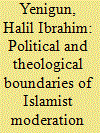| Srl | Item |
| 1 |
ID:
152448


|
|
|
|
|
| Summary/Abstract |
The third-term policies of the AKP (Justice and Development Party) in Turkey posed new challenges for observers: do top-down Islamization policies and the increasing pan-Islamist tone in Turkish foreign policy signify a return to Islamism or is a new amalgamation in the making? In this case, is ‘post-Islamism’ now dated as an analytical tool to characterize the AKP’s new ideological formation or was it always a misnomer? Drawing on el-Affendi’s (2008) distinction between the Medina and Damascus models and observing the new Islamic opposition to the AKP policies, its post-2011 ideological configuration will be analyzed with reference to an antinomy of Islamism vs. Muslimism. Muslimism, an extension of Damascus model, is a quest for power and seeks Muslim interests worldwide. Islamism, an heir to Medina model, may be characterized by an ethical pursuit of justice that occasionally clashes with Muslim political interests.
|
|
|
|
|
|
|
|
|
|
|
|
|
|
|
|
| 2 |
ID:
149446


|
|
|
|
|
| Summary/Abstract |
This paper explores the repercussions of the apparent failure of Islamist experimentations with democracy during the Arab Spring in terms of the moderation hypotheses with a specific focus on the Egyptian case. I build on the existing arguments that repression may paradoxically moderate mainstream Islamist movements with certain caveats: when Islamists eventually come to power, their ideological vision also matters within the nexus of their strategic commitments and the on-going power struggles with other Islamist contenders. The prospects of democratisation, then, may also depend on the theoretical and political success of an Islamist political theology that accords better with rights and freedoms than a simplistic procedural democracy. Repression may indeed lead to moderation of the well-entrenched mainstream Islamist groups. However, such analyses focus only on those who remain within the fold of the mother organisation, rather than the splinter groups that break away with their more radicalised views. Under the post-Arab Spring conditions and given the Salafi factor, current views on the repression–moderation cycle must also account for the defection among certain Islamist constituencies towards jihadi or vigilante Salafism.
|
|
|
|
|
|
|
|
|
|
|
|
|
|
|
|